Photographs: Mian Khursheed/Reuters
A jihadist takeover in Pakistan -- which is a 'real possibility today'-- would have devastating consequences not only for the country but the entire world, and particularly for India, says Bruce Riedel in his new book.
"A jihadist Pakistan would emerge through some combination of violence and intimidation. The simplest way would be another military coup led by a general who shares the worldview of Zia ul-Haq, the Pakistan dictator who ruled the country in the 1980s and defeated the Soviets with our help in Afghanistan, thus initiating the global jihad we face today," The Daily Beast quoted an excerpt from Deadly Embrace: Pakistan, America and the Future of the Global Jihad, as saying.
'China would be threatened as well'
Image: A man walks on the roof of the Red Mosque during a gathering in Islamabad to mark the first anniversary of an army raid on the complexPhotographs: Faisal Mahmood/Reuters
The new regime would also take control of the nuclear arsenal, and make NATO's current mission in Afghanistan "virtually untenable. A jihadist Pakistan would be even more of a safe haven for the Afghan Taliban than now," Reidel said in his book.
He noted that in such a scenario, Pakistan's relations with Iran would probably deteriorate, with Shia jihadist Iran and Sunni jihadist Pakistan becoming enemies and competing for their influence on Afghanistan's battlefields.
"China, historically Pakistan's main arms supplier, would be threatened as well by jihadists meddling in its far west," he added.
'Any chance for peace in Kashmir would be dead'
Image: A protester attends a demonstration in KarachiPhotographs: Athar Hussain/Reuters
Riedel, who chaired United States President Barack Obama's review of Afghanistan and Pakistan policy at the start of the administration two years ago, said that an Islamic takeover in Pakistan would be "particularly bad news for India, which would have little choice but to build up both its nuclear and conventional forces."
"Any chance for a peace agreement in Kashmir would be dead, and the new militant regime in Pakistan would increase support for the insurgency. A major mass-casualty attack like the one on Mumbai in November 2008 could spark a war," he added.
'Such a state would be a nightmare'
Image: A man prays, next to graffiti painted road-side, during an anti-Taliban rally in RawalpindiPhotographs: Adrees Latif/Reuters
The former CIA officer also pointed out that a militant Islamic state in Pakistan would have a massive ripple effect across the Muslim world.
"Extremists would be strengthened. A jihadist Pakistan would be the most serious threat the United States has faced since the end of the Cold War. Aligned with Al Qaeda and armed with nuclear weapons, such a state would be a nightmare, and all US options for dealing with it would be bad," he said.
Riedel, who is a senior fellow in the Saban Centre at the Brookings Institution, underlined that a Jihadi, nuclear-armed Pakistan is a scenario that must be avoided at all costs.
'For Obama, 2011 may be the year of Pak'
Image: Relatives pray near the coffins of victims, who were killed in a suicide attack at a military training centre, during their funeral ceremony in MardanPhotographs: Reuters
"That means working with the Pakistan of today to try to improve its very spotty record on terrorism and proliferation. While many (on both sides of the US-Pakistan dialogue) are pessimistic about whether cooperation/engagement between America and Pakistan will succeed, there is every reason to try, given the alternatives," he said.
The all-too-possible nightmare scenarios, which he mentioned in his book, should "impel the United States to focus on the current state of Pakistan. It needs to do better in Pakistan. For Obama, 2011 may be the year of Pakistan," Reidel concluded.

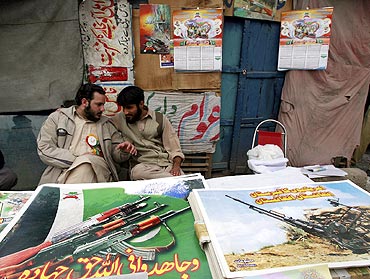
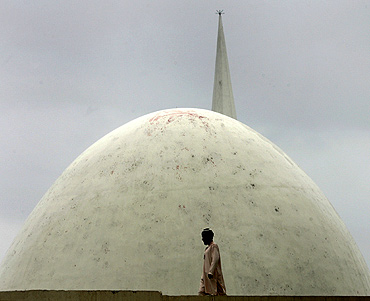
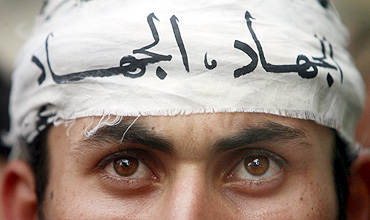
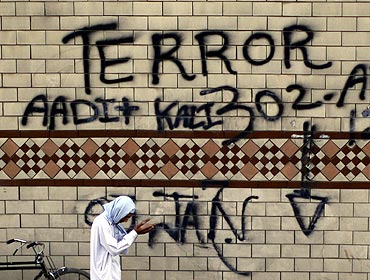
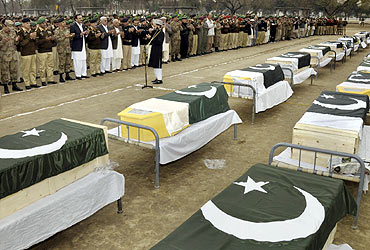
article